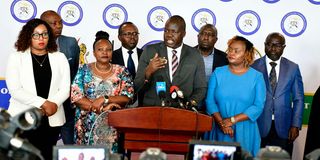Premium
19 by-elections, boundary review, 2027 elections: Why the IEBC team must hit the ground running

The chairperson of the Independent Electoral and Boundaries Commission (IEBC) Selection Panel, Dr Nelson Makanda (center, podium), briefs the media on April 25, 2025. He is with other members of the panel.
The new Independent Electoral and Boundaries Commission (IEBC) will be forced to hit the ground running immediately after its inauguration, as the recruitment panel concluded interviews on April 25.
The nine-member IEBC selection panel, chaired by Nelson Makanda, has been conducting interviews since March 24, 2025 and has interviewed 11 candidates for the post of IEBC chairperson and 107 others for members. The names of the top candidates are expected to be submitted to President William Ruto by May 11, 2025.
But with long overdue mini-polls in at least 19 constituencies, delayed delimitation, recruitment of senior IEBC staff and procurement of strategic election materials, as well as preparations for the 2027 general election, the new commission will have little time to catch its breath once in office.
There is also the possibility of a referendum on the constitutional amendments proposed in the National Dialogue Committee (Nadco) report to create the positions of Prime Minister and Official Leader of Opposition.
The Nadco report also proposes to enshrine in the Constitution the National Government Constituency Development Fund, the National Government Affirmative Action Fund and the Senate Oversight Fund, which may require a referendum.
Of the 19 pending by-elections, five are at constituency level and 14 at ward level.
Election expert Barasa Nyukuri says a free, fair and transparent election has always been an irreducible minimum that Kenyans have agitated for in the quest for a credible electoral process.
“The commission, once fully constituted, will not have the luxury of time as critical national assignments await,” says Mr Nyukuri, adding that “the commissioners must assure (Kenyans) of the elusive hope of a credible process not just in word but in deed as well.”
The six-year non-renewable term of immediate former IEBC chairman the late Wafula Chebukati and two commissioners – Boya Molu and Abdi Guliye – ended in January 2023.
The absence of commissioners left the IEBC a shell, as critical national assignments could not be undertaken without commissioners, who sit and make decisions at the plenary.
The secretariat headed by CEO Marjan Hussein Marjan was limited to training of staff and procurement of the nonstrategic materials. The nonstrategic materials have no direct impact on elections and all the secretariat requires is to ensure there is a procurement plan in place as well as an adequate budget.
Mr Johan Kriegler, the South African retired judge who chaired the Independent Review Commission on Kenya’s electoral reforms, recommended that IEBC commissioners must be in office at least two years before a general election.
This, according to Mr Kriegler, is critical to allow the commissioners to be trained in good time to start preparations that include recruiting suitable staff and procuring election materials.
“As a country we have wasted so much time. All we pray for is that the selection panel did its job above board and there will be no court injunctions, otherwise we run the risk of an extended constitutional crisis,” said Mr Nyukuri.

IEBC officials prepare polling material for a by-election in 2021.
The pending constituency by-elections include Baringo County whose senator, William Cheptumo, died on February 16, 2025; and Banissa, Magarini, Ugunja, Malava, Mbeere North and an ODM nominative slot in the National Assembly.
Banissa Constituency was left vacant after its former MP Hassan Kullow died in a road accident on March 29, 2023 and Magarini constituency became vacant after the Supreme Court on May 31, 2024 upheld the nullification of the election of Mr Harrison Kombe.
The appointment to Cabinet of then Ugunja MP Opiyo Wandayi on August 8, 2024 also necessitated the need for a by-election.
The filling of a nominative slot at the national and county level is also an election in itself. This means that then nominated MP Mr John Mbadi, also appointed to cabinet on August 8, 2024, will need a replacement undertaken by the IEBC.
The Malava Constituency seat was left vacant following the death of area MP Malulu Injendi on February 17, 2025.
The Mbeere North seat became vacant after President William Ruto appointed Mr Geoffrey Ruku to the cabinet on April 17, 2025 following his approval by the National Assembly.
Mr Ruku replaced then Public Service Cabinet Secretary Justin Muturi, who was relieved of his duties following his demands that the government come out clean on extra-judicial cases involving murders, enforced disappearances and abduction of Kenyans.
Kariobangi North MCA Joel Munuve collapsed and died on April 22, 2025.
In Kakamega County, Kisa East MCA Stephen Maloba died on April 1, 2023 following a knife-stabbing incident.
At the Coast, Tana River’s Chewani Ward fell vacant after the death of area MCA Hamisi Idd on June 17, 2023 in a road accident at Kangoni on the Garsen- Malindi road.
In Nyamira County, there are two MCA vacancies. Mr Denis Kebaso, Esise Ward MCA in West Mugirango constituency, lost his seat following a successful petition challenging his election. In Nyamaiya Ward, MCA Elijah Osiemo died on August 7, 2023 following a road accident.
A fully constituted IEBC is also required to undertake voter registration exercises to register at least 5.7 million new voters ahead of the 2027 general election.
The commission’s Deputy CEO Obadia Keitany recently told MPs that the IEBC has not been able to undertake the continuous voter registration exercise since the 2022 general elections.
“There were no commissioners to address policy issues that would have emerged and there were also no funds allocated for the exercise. Only the commissioners can approve budgets of the commission,” said Mr Keitany.
This is notwithstanding, the law provides for the Continuous Voter Registration (CVR) registration exercise.
Article 89 (2) of the Constitution states that IEBC shall review the names and boundaries of constituencies at intervals of not less than eight years, and not more than 12 years.
The Constitution also states that any review shall be completed at least 12 months before a general election of MPs.
This means that to comply with the Constitution, the IEBC ought to have completed the exercise either by July 2021- being 12 months to the August 9, 2022 general election or by February 7, 2024.
The last review was undertaken on the then 210 constituencies in 2012 leading to the creation of 290 constituencies that were gazetted on February 7, 2012 by the defunct Interim Independent Boundaries Review Commission (IIBRC).
Part 3 (4) of the first schedule of the IEBC Act states that after conducting interviews, the selection panel shall select two persons qualified for chairperson and nine others qualified to be appointed as members of the IEBC and shall forward the names to the president.
“The president shall, from the list, nominate one person for appointment as the chairperson and six other persons for appointment as members of the commission,” the IEBC Act states.
The law further requires that the president shall, within seven days of receipt of the names from the selection panel, forward the list of the nominees to the National Assembly for approval hearings “in accordance with the Public Appointments (Parliamentary Approval) Act”.
The amended IEBC Act states that the selection panel shall finalise the recruitment exercise within 90 days of its appointment and forward the names of the nominees to the President for nomination and transmission to parliament for vetting and “shall thereafter stand dissolved”.
However, the law allows parliament, by resolution passed in both the National Assembly and the Senate, to extend the tenure of the selection panel “for a specified period”.
Towards the end of March this year, the two Houses of parliament unanimously approved the resolution to extend the mandate of the selection panel by a further 14 days.
The members of the panel were appointed on January 27, 2025, by President Ruto via a gazette notice signalling the start of a process of reconstitution of the IEBC, whose immediate former commissioners left in January 2023 after serving their term.


